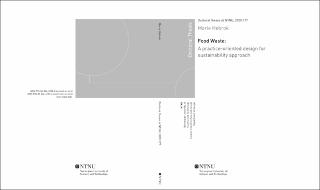Food Waste: A practice-oriented design for sustainability approach
Doctoral thesis
Permanent lenke
https://hdl.handle.net/11250/2676125Utgivelsesdato
2020Metadata
Vis full innførselSamlinger
- Institutt for design [1121]
Sammendrag
Summary of the thesis
This dissertation develops a practice-oriented design for sustainability (PODS) approach to explore opportunities for reducing household food waste by design. Through this approach it has produced narratives of current and possible future food-related practices that have been co-created with participants in order to elicit opportunities for design interventions. The narratives provide insights into how food waste occurs within the flow and rhythm of everyday life, how it is entangled in a web of interrelated practices and conflicting ideals, and how practices could be reconfigured in the future by design - imagining not only incremental innovations but also new ways of food consumption. Moreover, in light of the food waste case, it reflects on what the theoretical underpinnings of PODS mean for current and future ways of addressing sustainable consumption issues by design.
Two routes towards reducing food waste by design are identified, which are not mutually exclusive. The first route consists of product-level and product-service-level innovations, such as the ones that can already be seen in packaging, labelling, fridge/freezer technology, apps, box scheme services and online grocery shopping services. The second route entails reimagining and reconfiguring food-related practices more profoundly. This route involves rethinking how we go about provisioning for food, when and where we eat, how and where food is stored, etc.
The research presented in this dissertation has implications for actors working on issues related to sustainable consumption in general and on household food waste and food consumption in particular. It can be of interest to policymakers, non-governmental organisations, various actors in the food industry, and to commercial and public innovators of products and services seeking to contribute to sustainable consumption.
By making explicit the elements which practices entail and how they cause inertia and represent opportunities for change, it is argued that social practice theory provides a framework for increasing understanding and unpacking the complexity inherent in the role of practices in wicked design problems. Furthermore, that providing these insights enables us to approach the design problem in both incremental and radical ways, moving from ideas of product/service-user interactions to ideas of new ways of living.
The dissertation is based on a total of four articles: three peer-reviewed and published journal articles, and one submitted journal article. The research has been conducted in Norway. Sammendrag
Denne avhandlingen utvikler en praksisorientert design for bærekraft (Practice-oriented design for sustainability - PODS) -tilnærming for å utforske potensialet for å redusere matsvinn fra husholdningene gjennom design. Tilnærmingen har produsert narrativer om matrelaterte praksiser slik de er i dag og slik de kan bli i fremtiden. Fortellingene som har blitt skapt sammen med informanter og medforskere, har bidratt til å identifisere muligheter for å redusere matsvinn gjennom design. De gir innsikt i hvordan matsvinn oppstår i hverdagen, og hvordan matsvinn er et resultat av mange ulike praksiser og ofte av motstridende idealer. På bakgrunn av innsiktene fra forskningen presentert i denne avhandlingen, foreslås ulike måter designfaget kan bidra til å redusere matsvinn, ikke kun gjennom inkrementelle innovasjoner på produkt- og tjenestesiden, men også gjennom systemorientert tenkning der det utvikles idéer til nye måter å produsere, anskaffe og spise mat på.
Det identifiseres to spor som kan lede mot å redusere matsvinn gjennom design, og som ikke er gjensidig utelukkende. Det første sporet leder mot innovasjoner på produktnivå og produkt-tjenestenivå, for eksempel de som allerede kan sees i emballasje, merking, kjøleskap- /fryseteknologi, apper, matkassetjenester og netthandel av dagligvarer. Det andre sporet handler om å forestille seg hvordan matrelaterte praksiser kan endre seg mer radikalt. Denne tilnærmingen innebærer å tenke nytt rundt hvordan vi produserer, distribuerer og anskaffer mat, når og hvor vi spiser, hvordan og hvor mat blir lagret, osv.
Forskningen som presenteres i denne avhandlingen har implikasjoner for aktører som arbeider med spørsmål knyttet til bærekraftig forbruk generelt og med matsvinn og matforbruk spesielt. Den kan være av interesse for politiske beslutningstakere, frivillige organisasjoner, ulike aktører i næringsmiddelindustrien og for kommersielle og offentlige innovatører av produkter og tjenester som søker å bidra til et bærekraftig forbruk.
Består av
Paper 1: Hebrok, Marie; Boks, Casparus Burghardus. Household food waste: Drivers and potential intervention points for design – An extensive review. Journal of Cleaner Production 2017 ;Volum 151. s. 380-392 https://doi.org/10.1016/j.jclepro.2017.03.069Paper 2: Hebrok, Marie Cathrine. Food waste in the shadow of ideals - a case for practice-oriented design. Journal of Design Research 2018 ;Volum 16.(3/4) s. 314-333 https://doi.org/10.1016/j.jclepro.2018.11.141
Paper 3: Hebrok, Marie; Heidenstrøm, Nina. Contextualising food waste prevention - Decisive moments within everyday practices. Journal of Cleaner Production 2019 ;Volum 2010. s. 1435-1448 https://doi.org/10.1016/j.jclepro.2018.11.141
Paper 4: Hebrok, Marie; Mainsah, Henry. Bird: Design fiction and the futures of food consumption
